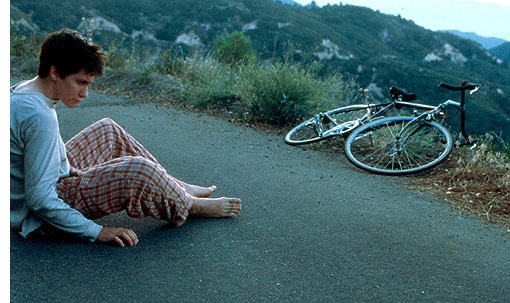Let it be noted that I was unsure whether to categorize this blog post under “Politics” or “Philosophy.” It has to do with both. I am not sure how long this post will be – I am not doing any extra research for it, rather I am merely putting to virtual paper things I have noticed over the past couple years regarding two diametrically opposed philosophies: Evangelical Christianity and popular atheism. But as these two philosophies have, of late, reached startlingly similar conclusions regarding international politics, and as that confluence of opinion is what I am writing about today, I suppose I will place this post under “Politics.”
There, it’s settled.
First, a little biographical info about yours truly: I was born and raised a Southern Baptist. I have many friends and family members who are quite active in the church, and I love and respect them greatly. I also have many – though admittedly not quite as many – friends and family members who are atheists. Many of them would call me a stupid tree-hugging hippie for saying so, but I also love and respect them greatly.
So again, I am not here to argue the merits of one philosophy over the other. And I hope nobody takes issue with my labeling these two things as “philosophies.” If anyone does, let me explain what I mean by “philosophy”: I mean it as a mode of thought, one that influences one’s actions and day-to-day life, for good or for ill. And I want to stress that I don’t mean any of this as an insult to anyone, I am merely relating my own observations. I might see you (whoever you are) a little differently than you see you, and conversely you might see me differently than I see me. I invite you to comment to your heart’s content on how you see me, either here in the comments section, or on my Facebook page. It is possible that all my observations are incorrect. At any rate, this post is not directed at any specific person, it is rather directed at specific philosophies. And as any philosophy worth having is a philosophy worth critiquing, I hope not to lose any friends – in real life or online – over this post.
A little more biographical info about me: I quit going to church with any regularity in the early 2000s. The principal reason for this was that church had become less of a place that encouraged me to be a better person and more of a place where I was told what to think, who to vote for, and that sort of thing. Perhaps it had always been that way to a degree – I remember impassioned sermons from my childhood on the evils of gay people, for example – but following 9/11, politics and church became so intertwined I just couldn’t bring myself to go anymore.
For example: it was widely preached that every Muslim in the world supported Osama Bin Laden. It was widely preached that Islam and Islam alone was responsible for all the evils in the world, and that the only hope for the future was to either convert every Muslim to Christianity, or else to just bomb the daylights out of them.
Meanwhile, then-President George W. Bush was praying on TV, spouting similar nonsense left and right, taking money away from education and putting it into “faith-based” programs, talking in oversimplified Orwellian terms like “axis of evil” and “the terrorists hate freedom” and that sort of thing.
If memory serves, there was a dramatic upswing in church attendance in the years following 9/11. There are probably many articles written about this already, but I theorize that this dramatic upswing was due to fear as much as it was to anything else.
People wanted to know why the terrorists “hated freedom.” People wanted to know why 9/11 happened. And even though the mastermind behind the tragic event had specific reasons why he talked 15 fellow Saudi Arabians, two men from United Arab Emirates, one Egyptian, and one Lebanese fellow into perpetrating the attack, and even though this mastermind specifically said that he was protesting US involvement in the Middle East, nobody seemed to notice that he had done so.
To be sure, I am not trying to justify 9/11 to anyone. I want to make that crystal clear. What I am trying to do is point out that the perpetrators of 9/11 had actual tangible geopolitical motivations for doing what they did. And yes, while radical Islam was definitely a factor there – they would have been less likely to intentionally kill themselves to make a political point, I venture, were there no promise of a blissful afterlife – it was not the only factor.
But Evangelical Christians didn’t want to hear that. They didn’t want to hear that people in other countries had been affected negatively by the actions of our government. They didn’t want to hear that the USA was not, in fact, universally loved and cherished by everyone in the world.
I want to pause here and say that I am not “anti-American,” nor do I hold any sort of “anti-American bias,” and I don’t hate myself for being American, so if anything like that is bubbling up in your psyche as you read this, I advise you to go take a cold shower and compose yourself.
What I want you – as in you, whoever you are, wherever you are, you, the person reading this right now – to realize is a very simple fact of life, one your parents should have taught you as a child: not everyone is going to like you, no matter how good of a person you try to be. Something you say, something you do, no matter how well-intentioned, is going to piss somebody off. It’s a cliché, sure, but put quite simply you can’t please everyone. That should go without saying, but it unfortunately doesn’t most of the time.
This is true on a personal level, and it is also true on an international level. Even if we assume that the USA has never taken any military action that wasn’t for “the greater good” or whatever, somebody somewhere is going to be offended by that action. Somebody somewhere is going to have a friend or family member who was killed by US forces, somebody somewhere is going to have their livelihood disrupted by economic sanctions the US imposed, somebody somewhere is going to be pissed off that the US took the leader they liked out of office and replaced that leader with someone they didn’t like.
It doesn’t require any sort of “mental gymnastics” or “guilt” or “self-loathing” to acknowledge this. Strictly speaking, it requires all three of those things to deny that this is the case.
“Hold on,” the reader may be thinking, “I don’t remember any Evangelical leaders talking about ‘mental gymnastics’ or anything like that. What are you getting at, asshole?”
At the same time, roughly, that Evangelical pastors and politicians were promoting the idea that the US had never done anything anywhere in the world ever that could possibly motivate anyone to dislike us or want to do harm to us, and that Islam was by nature evil, and every Muslim in the world supported terrorism, another philosophical/political movement was gaining steam: the “New Atheist” movement.
I don’t know who coined the term “New Atheist,” but originally the definition was, essentially, “an atheist who actively speaks out against religion.”
And I want to make it clear that I am fine with the idea of atheists who speak their mind about religion and the harm it can do. I support that fully. I support free thought, I support free speech, and I support science and reason. I agree fully that until the world stops basing its decisions on religious ideas, we’re never going to advance as a species.
And here, someone could make the obvious argument, one I have already made, that without the promise of an afterlife, the 9/11 hijackers would have been less likely to have hijacked planes and crashed them. Islam was certainly a factor.
Just like Shinto – Japan’s native religion – was certainly a factor in the phenomenon of Kamikaze pilots.
Just like Christianity – yes, Christianity – was certainly a factor in motivating Adolf Hitler to try to kill every Jewish person in the world.
Just like Buddhism – yes, Buddhism – was certainly a factor in motivating the South Vietnamese people to side with the Viet Cong.
(To explain those comparisons, “Kamikaze” translates to “divine wind” in English. Kamikaze pilots believed they were doing a divine service to their native land by giving their lives to defend it. Do a quick Google search on “religious views of Adolph Hitler” to find quotations about how he believed he was serving God by killing Jewish people. And, if you have a couple hours to kill, watch the film “Hearts and Minds” on YouTube. It’s a documentary about the Vietnam war, and one Buddhist monk states [I am paraphrasing] that as long as the US remained in Vietnam, attempting to change Vietnam to suit its own ends, the Vietnamese people would continue to fight. And indeed they did.)
And here it may appear that I am, by pointing out that religions other than Islam have played roles in various wars, siding with the New Atheists. But somewhat perplexingly, this is actually where my views and those of prominent New Atheist thinkers part ways.
For example, many New Atheists conveniently overlook the fact that the US invasions of Afghanistan and Iraq were at least partially motivated by George W. Bush’s religious beliefs. God told him to invade Iraq and depose Saddam Hussein. Bush actually said that.
Whether he truly believed it is irrelevant. He used it to reduce a complex geopolitical conflict, one that began a long time before 9/11, to a simplistic “Islam is evil” argument that Evangelicals just ate up with a spoon. And so did, amazingly, those beacons of “science” and “reason,” the New Atheists.
Although they’ll deny it, of course. Their thinking, they will assure you, is completely and totally motivated by “reason.”
As a supporter of reason myself, I would like to say that I admire the desire to think only in terms of reason. But I would like to also state, unequivocally, that it is impossible for anyone to base every decision and every judgment call on “reason.” It is impossible. It is, indeed, a consummation devoutly to be wished, but it is not something that is possible.
The most rational person on the planet is still subject to emotion. And like it or not, “fear” is one of the most influential emotions there is. For politicians – and for that matter, for writers who wish to sell books – it is also one of the most useful.
To be sure, New Atheist writers have exposed a great deal of terrible things that happen in the Muslim world. For that reason, I salute them.
But I have to call “bullshit” on their assertion that “Islam” is the sole cause of all the problems in the Middle East. And also on their delusion that US intervention in the Middle East had nothing to do with the religious beliefs of Americans.
I salute them for elevating science and reason over superstition. But I criticize them for the simple reason that this has inadvertently led them to believe that science and reason motivates everything the US and the West does. This is just as simplistic of a worldview as the one Evangelicals promote. This worldview posits that the actual, tangible, real-life military exploits of the US and the West have no effect whatsoever on the world.
The single most common rebuttal this worldview produces, when, for example, it is pointed out that Islamist terror has actually increased since the “War on Terror” began, is that whoever points that out “hates America,” has an “anti-American bias,” or simply suffers from “guilt” or “self-loathing.”
Try to wrap your head around that: if you, an American, acknowledge that not everybody in the world loves and cherishes you simply because you are an American, it means you hate yourself. This is presented as an argument any time any Westerner critiques US and/or Western military intervention overseas.
Here’s an analogy: let’s say you’re driving your car through a residential neighborhood. You’re obeying the speed limit, you’re not intoxicated, but you happen to glance down at your phone for a second, let’s say. You don’t see the dog bounding into the street, chasing an errant tennis ball, and you run the dog over, killing it.
The owner of the dog is standing in his front yard. He saw you look down at your phone, and just for the sake of argument let’s say this person has a high-resolution security camera on the front of his house, and this camera captures not only your car running over the beloved family pet, but also you taking your eyes off the road to look down at your phone, or at any rate to look down at something in your passenger seat.
The dog owner takes you to court, presents evidence that you were negligent, shows your negligence and its bloody result, but you insist that you are innocent. You refuse to apologize or even acknowledge, despite clear evidence, that you were in any way at fault. Your defense is that the late dog’s owner simply does not like you. It isn’t anything you actually did, he’s just an asshole and he hates you because he’s an asshole. You were not at fault in any way.
This is, essentially, the common worldview shared by Evangelicals and New Atheists. That the US and the West have never ever actually done anything that people in other countries could potentially get pissed off about, and that anybody anywhere who complains about US and Western intervention is simply an irrational asshole. And also, if you happen to be an American or a Westerner, and you happen to point out that some people in other countries might not like it when the US and the West invades them, well, you hate yourself. It’s mind-boggling, the level of selective blindness involved in this worldview.
The majority of people from these two groups never interact with each other. The majority of people from these two groups think that the other is their sworn enemy. They don’t realize, for the most part, that their views on international politics line up almost perfectly. They don’t realize, for the most part, that their shared selective blindness is a direct result of their seemingly opposing philosophies.
Many Evangelicals think that the only way to end conflict in the Middle East is to either convert everyone there to Christianity, or, alternatively, to bomb the daylights out of them.
Many New Atheists think that the only way to end conflict in the Middle East is to either convince everyone there to be an atheist, or, alternatively, to bomb the daylights out of them.
Because, both groups believe, people in other countries welcome bombing raids. People in other countries are ecstatic with joy and thankfulness when the US and the West flies overhead, dropping bombs and blowing stuff up. Anyone who dislikes the US and the West for flying over their country and blowing stuff up, both groups believe, is simply either evil or else suffering from some sort of mental defect.
Think about this: how angry were you on 9/11? How great was the feeling that you had been violated, that everything you had ever known and loved was now put in danger? How much hatred did you feel toward the people who perpetrated 9/11?
I know I felt a lot. I can’t speak for anyone but myself, but it certainly made me angry. I felt like the sanctity of my nation’s borders had been violated, for sure.
And that was from one single attack. It was a tragedy, I am not saying it wasn’t, don’t attempt to twist what I am saying into something it isn’t. What I want you to understand is that people in other countries do not simply welcome invasions and bombing raids as a show of good will, any more than any American welcomed 9/11. It does not require you to feel guilty to acknowledge this. It does not require you to hate yourself or hate America to acknowledge this, and it most certainly does not require any sort of “mental gymnastics” to acknowledge this.
Acknowledging that you have – even unintentionally – caused harm to someone else does not equate to “self-loathing,” no matter how many times anyone claims it does. It never has, and it never will. It is quite simply part of being a grown-up. A five-year-old might be forgiven for refusing to acknowledge that he hurt someone by pushing them down, but an adult shouldn’t be.
Let’s be adults, eh?
I hope you all have a nice day.










